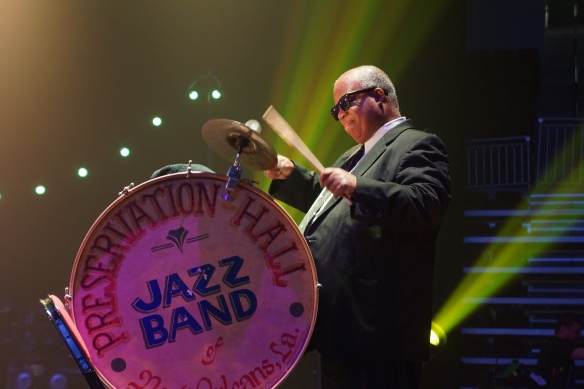
Joseph Lastie Jr.of PHJB: Boston, January 1, 2013
Founded in 1961 by Allan and Sandra Jaffe in the French Quarter of New Orleans, Preservation Hall began as a live music venue to showcase and create a sanctuary for jazz music in the city where it all began.
Not long after they opened their doors, a house band, known simply as the Preservation Hall Jazz Band, was formed. Several incarnations and 50 years later, Preservation Hall continues to fulfill their mission with Ben Jaffe assuming his father’s responsibilities as well as playing tuba in the band.
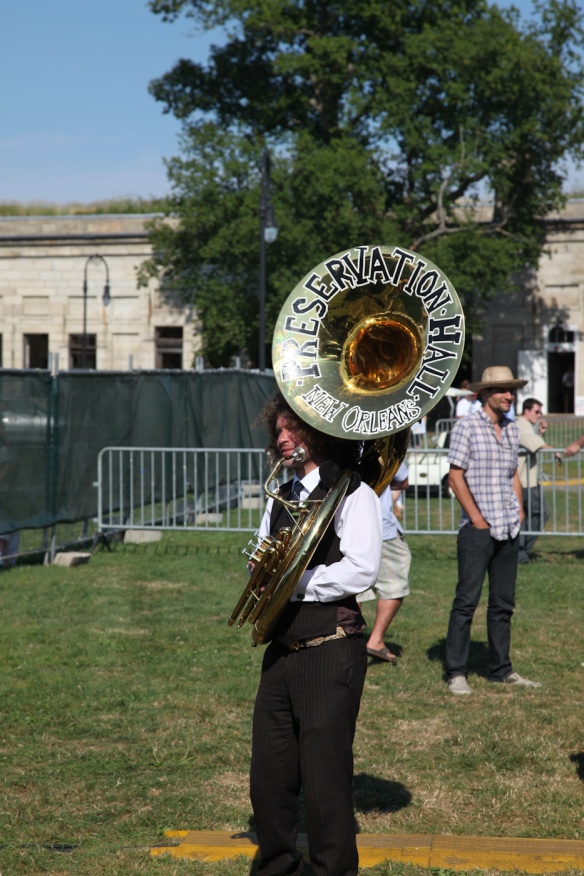
Ben Jaffe, Newport Folk Festival 2010
In their half-century existence, the Hall and its band have never strayed from the ideals they were founded upon. The tiny, 100-person capacity venue still hosts music twice a night, 7 days a week as a way to preserve New Orleans’ jazz heritage. And while the band still spends most of their time performing at home, the outfit has also branched out, bringing the sound of their city to you, touring the country and collaborating with musicians and bands from all genres of the musical spectrum.
A few days ago, on New Year’s Eve, the Preservation Hall Jazz Band opened for My Morning Jacket in Boston at the Agganis Arena. They later joined the band midway through their set and continued to perform until the end.
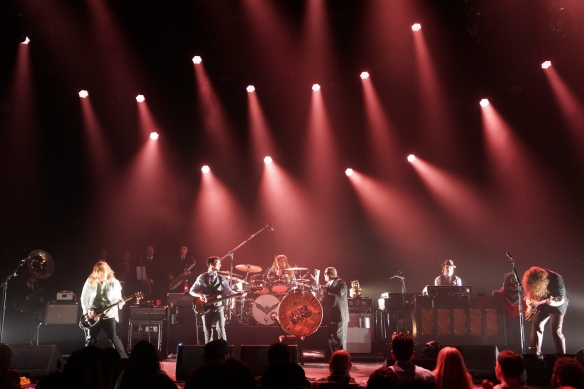
MMJ + PHJB together on New Year’s Eve: Boston, 2012
The following interview was originally conducted this past summer as the PHJB prepared to play both the Newport Folk Festival AND the Newport Jazz Festival… a true testament to the band’s talents, diversity and versatility. I had the pleasure of interviewing Ben Jaffe (tuba player/music director/son of Preservation Hall founders) who graciously donated his time despite being on-call for the birth of his first child. The exclusive photos included in this story were taken from are from Newport 2010 and 2012, as well as this New Year’s Eve show in Boston.
Cheers. Happy New Year.
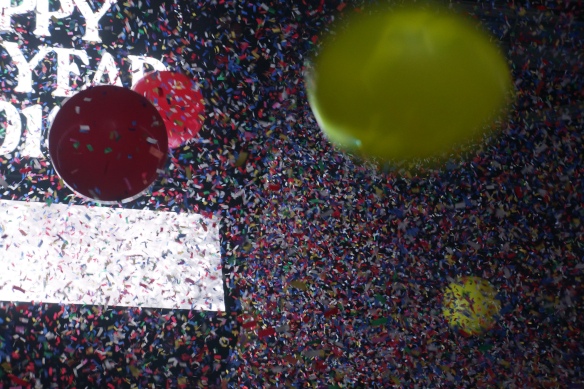
Agganis Arena, Boston, 12:01am, 1/1/2013
As far as the playing at the Preservation Hall vs. touring, how often do you leave New Orleans and take the band on tour?
Well, we’re in a fortunate and unique kind of situation and the band doesn’t tour like traditional bands that release a record and then tour. We are on the road all the time. And we’re lucky because we have Preservation Hall to play at when we’re home. So, even when we’re not on tour, we’re still playing all the time. We probably do 100 shows a year on the road and maybe do another 150 appearances in New Orleans.
How often do you actually play at the Hall?
When we’re in New Orleans we play there three times a week. You can always get some Preservation Hall Jazz Band.
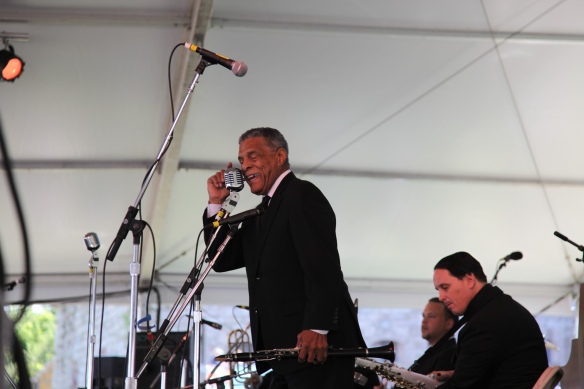
Clarinetist, Charlie Gabriel takes on vocal duties at Newport Folk Fest 2010
But there’s music there every night whether you’re in town or not?
Yeah, Preservation Hall has about 18 bands and 70 musicians that rotate into Preservation Hall in any given month and we try to present not only the older generation of musicians, but also the younger, up and coming generations of musicians as well. We try to emulate, as best as we can– the way that music has always been passed down from generation to generation in New Orleans. What’s amazing about New Orleans music is that it’s an unbroken bloodline dating all the way back to the earliest days of jazz. There are very few styles of music, particularly in the US, that we can claim to be our own– something that’s purely American and something that we didn’t have to bring back from extinction. New Orleans music is connected to the community because the community is still attached to the music. Our clarinet player is 80 years old and he’s a fourth generation New Orleans musician. SO his great, great grandfather was playing music in the 1850’s in New Orleans… before jazz. To me, that blows my mind. His grandfather is credited for being one of the first jazz bass players. And then you have Charlie, and underneath Charlie there are three or four younger generations playing music in his family.
So it is said that your dad created the Preservation Hall to keep New Orleans music alive. Was there a scare that it was going to lose its identity?
Well, I won’t give you too much of a history lesson, but New Orleans music in the 1920’s was when Louis Armstrong was coming into his own. New Orleans jazz was the hip-hop of its day. To me Louis Armstrong and Jelly Roll Morton they were the Jay-Z and Kanye of their day. They were breaking new ground and newspapers were saying that they were corrupting our youth. In the 1920’s, jazz was being played in what you would call the “off-color” kinds of places. It wasn’t being played in concert halls like it is today. It’s amazing that jazz has gone from the brothels to Carnegie Hall. That’s an incredible story unto itself. But like any music, it goes through cycles, and in and out of popularity. When my parents were in college, New Orleans jazz fell off the radar for most people. Though the musicians were still alive, as a country we still hadn’t accepted these musicians for the legends they were. If you look at the 1950’s and 60’s, just what was happening in our country and what was happening politically and socially, the South was still the Jim Crow South. The Civil Rights Amendment hadn’t passed yet, so there wasn’t an appreciation of the American-American culture. There were people who started documenting American culture like Alan Lomax and his father and the Smithsonian and Folkways records. These people started embracing things that were uniquely American– and jazz was one of those things. And it witnessed a revival in the 1950’s… kind of what’s going on with bluegrass now. It’s interesting. There was a revival movement on the east and west coasts and a bunch of New Orleans revival jazz bands that popped up. It’s a fairly easy style of music to get into, but it’s an extremely difficult style of music to master. It’s like a harmonica—it’s an easy instrument to get started on. And that’s what brought my parents to New Orleans. There was their love of New Orleans music and some other intangible thing—something that inspired a couple from Philadelphia to move to New Orleans in the midst of something like the civil rights movement. This was a white, young, Jewish couple, opening a venue that celebrated African-American music. I mean this is something that people were getting run out of town for doing. It still wasn’t legal or socially acceptable for blacks and whites to hang out socially either.
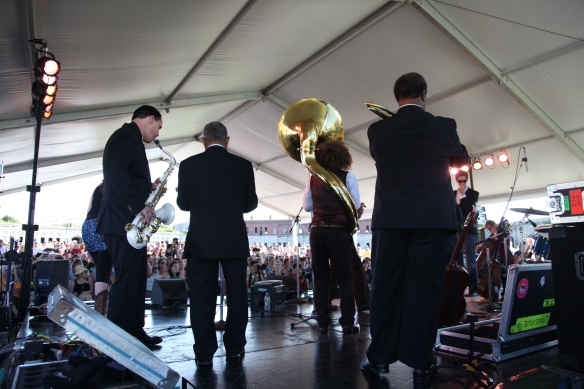
PHJB: Newport Folk Fest 2010
Do you remember your first times at Preservation Hall?
When my parents first moved to New Orleans, they actually lived in the courtyard behind Preservation Hall in the old servants quarters. Preservation Hall was a communal setting for many years. Many artists would come through and set up shop there from time to time. When I was born we actually lived two blocks away, so I actually grew up in the French Quarter. It’s interesting you ask me that question because I reflect on that a lot. It is our 50rh anniversary and I’m asked that question a lot. I never really gave it much thought because it was the only experience I knew. It never seemed extraordinary or out-of-the-ordinary to grow up in the French Quarter. Doesn’t everybody grow up a block off of Bourbon Street and hear music 24 hours a day? Honestly some nights I would come home and the same people that were at Preservation Hall that night would be sitting at the corner bar while I would be walking to school in the morning. And they’d be there when I was coming home at night. I don’t remember my first time at Preservation Hall. I’m probably one of the few people besides my brother that can say that. We don’t remember because we grew up there. It is a part of who we are. I don’t remember a lot of things. I don’t remember the first meal I ever ate. It’s kind of like that. It’s always been there. In reality I spent every day of my life in some way at Preservation Hall.
Was there ever a doubt that you would do anything but be a musician and take up the reigns of the place?
I think it’s interesting because you grow up and you kind of realize you become a product of what you’re exposed to. What I was exposed to was a beautiful world of music. It’s not that I ever thought I was going to become a musician in my life… it’s just that I didn’t know how to become anything else. It really wasn’t until I was in my teens when I started meeting people outside of music and outside of the arts—people I guess that we considered having more traditional family lives where the dad would go to work, come home and sit down to dinner. I mean we didn’t know what our day-to-day lives would be like. My dad was a working musician as well as a manager for the Hall and the band, so he was being pulled in many directions.
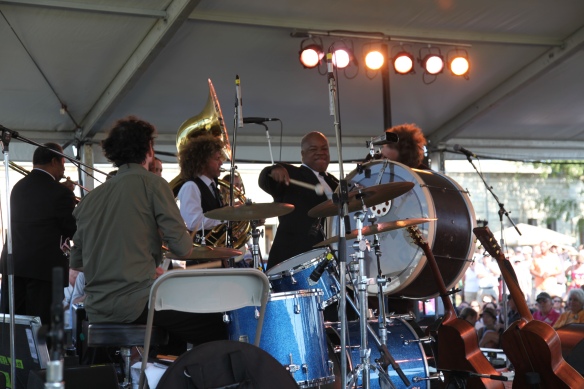
PHJB: Newport Folk Fest 2010
I officially joined the band when I got out of college in 1993. But I started playing around town between the ages of 9 and 14, sitting in with bands and jamming and learning music.
Does the Preservation Hall Jazz Band have a core group of musicians that defines the band with an extended group of musicians on the periphery?
Yes, there is a core Preservation Hall Jazz Band. That’s the band that does the recording and is the face of the band. But we have so many musicians that create the greater family. The beautiful thing about the Hall and the group is that it doesn’t need to remain one thing. We can have that flexibility and play in different configurations with different instrumentation. And that’s something that I never knew was actually out of the ordinary. As I get older, you meet more people who are amazed that you can work with so many different people. We can be on a stage, or at a festival, jamming with a rock band, playing in a jazz club or in a parade. It’s amazing how flexible our music is. It’s a beautiful thing. We don’t even need electricity, mind you. How many bands can say that?
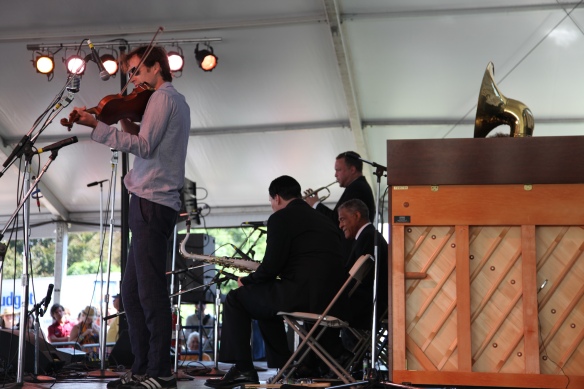
Special Guest Andrew Bird with the PHJB: Newport Folk Fest 2010
Oh yeah, we’re talking some about some of the best most accomplished jazz musicians in the entire world. These guys don’t always get enough credit for being the improvisers that they are. Sometimes with the setting that we end up in, we don’t always get to flex our chops, so to speak. And I think that its incredible that we have guys who are some of the greatest jazz musicians in the entire world, and yet we have all made this choice in life to continue to perform in the style that we grew up with.
How much of a set is improvised? When you go into a particular setting, do you know what you’re going to play?
We don’t really know until we get to the venue what our repertoire is going to be for that show. There is something unique about every time we go out on stage. For me it is very important to go on stage and see what the venue is like, what the crowd is like and get an overall feel for the situation. Sometimes we show up and decide we’re not going to use any microphones, or we’re outdoors and we’re playing for 12,000 people and we want it to be a bigger, dancier type of show. Tonight we’re in a recital hall and there won’t be any microphones and it’s going to be more of a concert. It’s beautiful to have that sort of flexibility and to have hundreds of songs in your repertoire to pull from at any given moment. That’s something I grew up with. As far as the improvisation that happens, we never play the same song in the same way twice. You play songs and you hear them and you work up arrangements. But the only way we work on arrangements is so when we get on stage we can throw that all out the window. We’re never really sure where a song is going to go. That’s the beauty of jazz—navigating that very fine line.
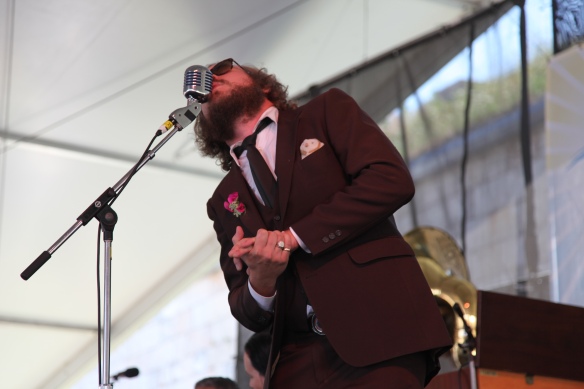
Jim James guest appearance with the PHJB: Newport Folk Festival, 2010
I’m about to have my first child. The person who is taking my place was actually a former student of mine. When I came back to New Orleans in 1993, I taught at my alma mater, the Old New Orleans Center for the Creative Arts. So one of my students, Ronnelle Johnson, is taking my place. He’s not that much younger than me. I think that’s amazing. Can you think of any other band that has an age range from their 30’s to their 80’s? That’s incredible.
Are you just taking a little time off to have the child?
Yeah, we’re literally expecting any day now. I just played a show in San Francisco and flew home immediately after the show. I’m home with my wife now. Literally it’s hour to hour. We’re going to remain nomadic as a band and I’m introducing this new member to the band, which is a beautiful thing to be able to do… giving another New Orleans jazz musician an opportunity to be involved.
How does the band work as far as recruiting new members and wanting new members? Does it happen naturally? Is it a closed circle?
Yeah, there’s a process. But the process began 100 years ago. I can say that every member of the Preservation Hall Jazz Band has always come from New Orleans and has always been from a musical family. I wouldn’t say that’s the criteria, but it is important that the members of the band are members of the community. There’s something in our DNA and in our soul. I think that that’s why it’s important to know that we’re trying to perpetuate this tradition. We’re not a repertory band. We’re not trying to sound like a band that existed 100 years ago. What we play today is what people listen to in New Orleans. You can go out and listen to this music any night in New Orleans. There is another generation coming up that are playing this music in their teens. People pass the torch down and we have the obligation to make this music available to younger people. And you know what, there is something different about New Orleans. There is something special about this city. There’s something you can’t ever learn or study. There’s something intangible you know from living here. The red beans and rice, the church on Sundays, the parades, Mardi Gras. Wherever you grow up, you’re a product of that environment. Preservation Hall is just a reflection of our community.
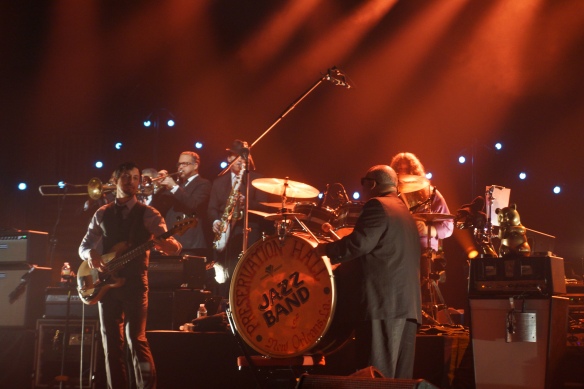
PHJB together with the MMJ rhythm section: January 1, 2013
Yes, all of those things. We have a real challenge because it’s easy for New Orleans to be portrayed as a circus. We can fall into this Las Vegas and Disneyland category. That is something that has always been a challenge for me personally. It’s a challenge for people to see beyond that first level of Mardi Gras beads and Bourbon Street and see how deep our traditions are here. What the hurricane did here was reveal to the world exactly what New Orleans is. We’re not just Spring Break and cheap Chinese Mardi Gras beads–although that is a part of New Orleans…always has been, always will be– but that’s not all we are. That’s not the New Orleans I’m a part of. The New Orleans I know is marching in parades and going to musicians’ houses and knowing their families and learning to cook by those musicians. What the hurricane did was give us a stage to tell our story in a modern age. We’ve had awful hurricanes before, but we never had access to the international stage through the internet and national media. If it happened 30 years ago, people wouldn’t have known for weeks. Now you can wake up in London and watch it on CNN. It’s minute by minute. And that was an incredible feeling, and still is. Without that support we wouldn’t have come back as a city. Katrina brought us to our knees and it’s amazing that we were able to come back and rebuild.
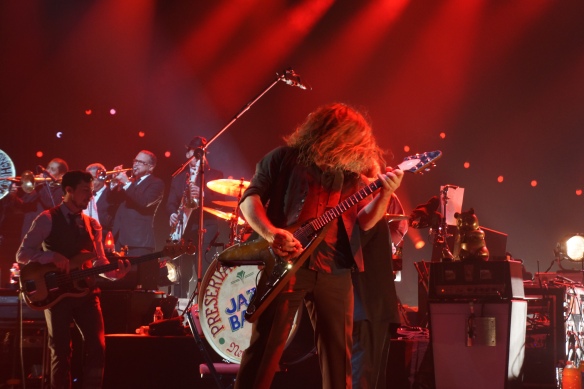
The Preservation Hall Jazz Band behind a Jim James guitar solo, New Year’s Eve, Boston, 2012
for more information on the PHJB:
http://www.preservationhall.com/band/index.aspx
and for more information on the history of the Hall and current venue listings:
http://www.preservationhall.com/hall/index.aspx
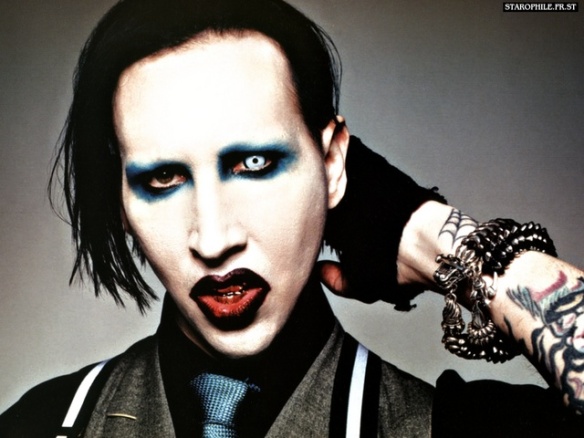 I tried for an interview, but it didn’t happen. Still, I went to the show hoping to see a spectacle.
I tried for an interview, but it didn’t happen. Still, I went to the show hoping to see a spectacle.










